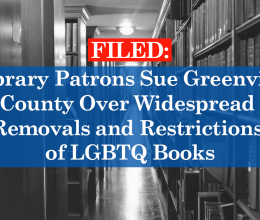
On March 26, 2025, local library patrons sued officials in South Carolina’s most populous county for systematically purging literature by and about lesbian, gay, bisexual, transgender, and queer (LGBTQ) people from its public library collection.
The lawsuit asks a federal court to permanently block Greenville County’s policies and practices that have deliberately hidden or removed dozens of books that positively portray transgender and gender-nonconforming people.
New policies adopted by the Greenville County Library Board in 2024 require that all materials with “illustrations, themes, or story lines [that] affirm, portray, or discuss changing the appearance of a minor’s gender in ways inconsistent with the minor’s biological sex” or with “illustrations, themes, or storylines that celebrate, portray, or affirm gender transitioning” must be removed from the juvenile and young adult sections of the library. The library system has moved these books to adults-only sections of the library, limiting access for young readers.
Meanwhile, the library system has completely removed dozens of titles that positively portray LGBTQ people, including in adult sections of the library. The library system’s leadership has granted more than 50 requests from the Greenville County Republican Women’s Club to remove LGBTQ materials, while disproportionately refusing other patrons’ requests to order new LGBTQ materials.
Why this case?
Libraries are for everyone. So is the U.S. Constitution.
The plaintiffs are asking the court to uphold the freedom to access information, a right derived from the First Amendment. They also ask the court to uphold the Fourteenth Amendment right to equal protection under the law for all Greenville County residents.
Local library defenders have been showing up and speaking out for years about a pattern of discrimination from the Greenville County library's leadership. We're proud to represent a few of those courageous folks in this legal action.
The latest
The ACLU and the ACLU of South Carolina filed an intial complaint on March 26, 2025, in the U.S. District Court for the District of South Carolina.








